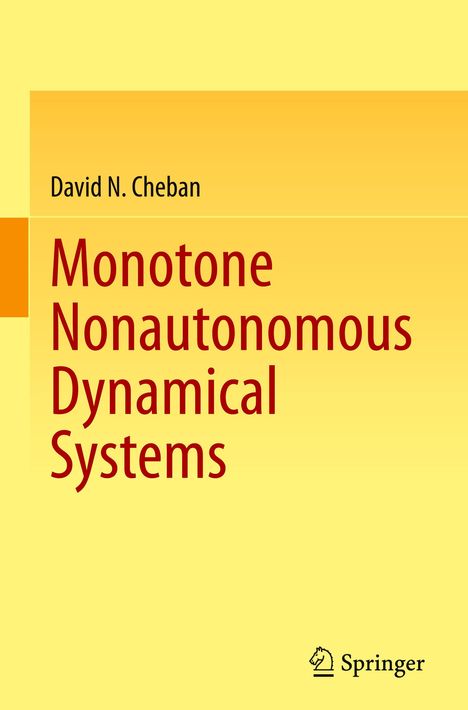David N. Cheban: Monotone Nonautonomous Dynamical Systems, Gebunden
Monotone Nonautonomous Dynamical Systems
(soweit verfügbar beim Lieferanten)
- Verlag:
- Springer, 07/2024
- Einband:
- Gebunden, HC runder Rücken kaschiert
- Sprache:
- Englisch
- ISBN-13:
- 9783031600562
- Artikelnummer:
- 11921191
- Umfang:
- 480 Seiten
- Gewicht:
- 881 g
- Maße:
- 241 x 160 mm
- Stärke:
- 32 mm
- Erscheinungstermin:
- 16.7.2024
- Hinweis
-
Achtung: Artikel ist nicht in deutscher Sprache!
Weitere Ausgaben von Monotone Nonautonomous Dynamical Systems |
Preis |
|---|---|
| Buch, Kartoniert / Broschiert, Englisch | EUR 164,28* |
Klappentext
The monograph present ideas and methods, developed by the author, to solve the problem of existence of Bohr / Levitan almost periodic (respectively, almost recurrent in the sense of Bebutov, almost authomorphic, Poisson stable) solutions and global attractors of monotone nonautonomous differential / difference equations. Namely, the text provides answers to the following problems:
- Problem of existence of at least one Bohr / Levitan almost periodic solution for cooperative almost periodic differential / difference equations;
2.¿Problem of existence of at least one Bohr / Levitan almost periodic solution for uniformly stable and dissipative monotone differential equations (I. U. Bronshtein's conjecture, 1975);
3.¿Problem of description of the structure of the global attractor for monotone nonautonomous dynamical systems; ¿
4.¿The structure of the invariant / minimal sets and global attractors for one-dimensional monotone nonautonomous dynamical systems; ¿
5.¿Asymptotic behavior of monotone nonautonomous dynamical systems with a ¿rst integral (Poisson stable motions, convergence, asymptotically Poisson stable motions and structure of the Levinson center (compact global attractor) of dissipative systems);
- Existence and convergence to Poisson stable motions of monotone sub-linear nonautonomous dynamical systems.
This book will be interesting to the mathematical community working in the field of nonautonomous dynamical systems and their applications (population dynamics, oscillation theory, ecology, epidemiology, economics, biochemistry etc). The book should be accessible to graduate and PhD¿ students who took courses in real analysis (including the elements of functional analysis, general topology) and with general background in dynamical systems and qualitative theory of differential / difference equations.



